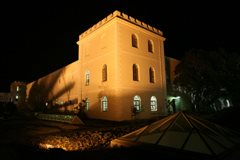GSB study investigates ROI from leadership development

Evidence emerging from a study being conducted with the UCT Graduate School of Business (GSB) suggests that there can indeed be a strong, measurable ROI for businesses investing in leadership development programmes - something HR practitioners have long suspected, although have struggled to prove to the satisfaction of their finance-orientated colleagues. In the study, respondents reported financial gains running into the millions of rands.
The ongoing study looks at the ROI from the GSB's Programme for Management Development (PMD), a flagship GSB Executive Education short course which annually attracts managers from many leading companies both in South Africa and other parts of sub-Saharan Africa. The PMD is targeted at middle-to-senior level managers and is the School's longest-established and one of its most successful senior leadership development programmes.
According to Programme Director and convenor of the ROI study, Bruce MacDonald, PMD is a very popular programme, enjoying a repeat business rate of between 80% and 90%.
“So it is obvious that sponsoring companies already recognise its value. What we are endeavouring to do is give an accurate idea of how sponsoring attendance on the programme impacts the bottom-line.
“Typically, feedback from such a programme is couched in qualitative terms. The problem is, qualitative feedback doesn't cut much ice with the number crunchers. My research is aimed at providing HR practitioners with the wherewithal to communicate with the bean counters in terms that they will relate to - and thereby improve their access to limited financial resources,” says MacDonald.
He points out that a ROI study in management education has its challenges.
“Management effectiveness is not inherently measurable - unlike the case of, say, a touch typist, whose output and performance improvement can accurately be measured. Management effectiveness is generally measured in unquantifiable ‘touch-feely' terms - ‘better communication', ‘better delegation' and ‘better working relationships',” he says.
MacDonald's survey of 110 past PMD participants provided rich ‘soft' feedback suggesting that the programme had achieved its objectives. 97% of respondents reported that the programme had been either ‘completely successful' or ‘largely successful' in providing them with an improved understanding of the nature, requirements and responsibilities of a manager's job. 96% believed that the course had given them substantially improved effectiveness as leaders through a better understanding of human behaviour and individual differences.
When asked by what percentage their personal effectiveness had increased as a result of participation in the programme, the average estimate was an improvement of 42%.
In response to a question about the financial gains realised from post-programme projects, some 30 estimates were provided, along with brief descriptions of the projects - describing gains of up to R12 million.
This last response is what has excited MacDonald and he will be following up to better quantify the financial ROI.
“Helping HR managers to present credible quantitative results to senior management can only further enhance the appeal and popularity of programmes like PMD. If we can make a strong quantitative case to back up the qualitative findings, HR managers can clearly show the course pays for itself in real terms, in some cases many times over.”
MacDonald will be completing the research in the coming months. The next PMD is set to run from 9 to 22 May, 2010. A typical class profile will include about 30 participants from 20 companies in 15 different industries, and up to ten different African countries. Some 70% of the class will be from African countries outside of South Africa.
Contact Mario Pearce on 021 406 1268 or , or SMS ‘PMD' to 31497 for more information or to apply. Standard rates apply.
For more information on the research project to quantify ROI, contact Bruce MacDonald on .
- The University of Cape Town MBA cements its position as a global leader in teaching sustainability and impact11 Nov 13:15
- UCT GSB and TETA launch game-changing skills programme17 Jun 12:26
- UCT GSB’s EMBA ranked best in Africa and 11th globally by CEO Magazine28 Mar 17:04
- University of Cape Town MBA students win global innovation competition28 Nov 14:43
- New ranking places the University of Cape Town’s MBA #7 in the world12 Nov 12:58



























